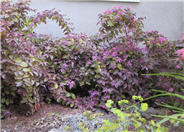
Common name:Red Fringe Flower
Botanical name:Loropetalum chinese 'Rubrum'
Red Fringe Flower is a 6-12' shrub with arching branches and light green and reddish leaves .
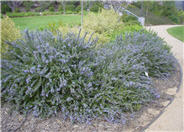
Common name:Prostrate Rosemary
Botanical name:Rosmarinus officinalis 'Prostratus'
The 'Prostratus' grows to a height of 2-3' with a spread to 8'. Its flowers are pale, lavender-blue in color, and the leaves are needle-like with a dark, blue-green color. This plant makes a good ground cover, and its leaves can be used as seasoning in cooking.
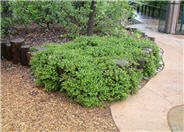
Common name:Manzanita Emerald Carpet
Botanical name:Arctostaphylos 'Emerald Carpet'
The 'Emerald Carpet' is an evergreen groundcover that grows to 1' tall by 6-8' wide. It is favored by many landscapers as the manzanita of choice for inland situations. It has dark green leaves and exhibits compact growth. This variety is relatively tolerant of adverse soil conditions. -Monterey Bay Nursery
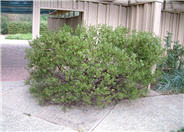
Common name:Howard McMinn Manzanita
Botanical name:Arctostaphylos densiflora 'Howard McMinn
This shrub is highly appreciated for its decorative characteristics, which include a dense show of small, pale pink, urn-shaped flowers. Above all, it is the mahogany-red to brown bark (which peels beautifully) that is the major attraction. Its fruit resembles the tike apple, and the flowers contrast perfectly to the light green leaf (which can get rather tough). It blooms from late winter to spring. - Cornflower Farms
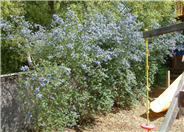
Common name:Blue Blossom Ceanothus
Botanical name:Ceanothus thyrsiflorus 'Skylark'
The blue blossom ceanothus is a shrub that has dark blue flower clusters that bloom profusely . This smaller growing selection grows to 6' H x 4-6' W. This shrub attracts butterflies, hummingbirds and beneficial insects. Its native counterpart can be found from sea level to 1500 ft. elevations in mixed evergreen and redwood forests of the Coast Ranges. -Cornflower Farms (edited)
| Designer: Thomas Scherer and Associates | Ground Cover Magic |
Photographer: GardenSoft |
Soils and Compost:
Physical weed control, including mulching, or hand removal protects the watershed from harmful chemicals.
Water Saving Tip:
Water trees and shrubs by deep-soaking occasionally with low-volume irrigation equipment (drip, micro-sprays, or bubblers) to promote healthy, deep rooting.
Integrated Pest Management:
Attract, or buy beneficial insects such as ladybugs and lacewings to control pest outbreaks in your garden.
